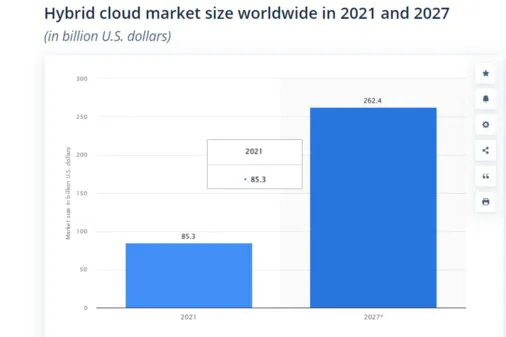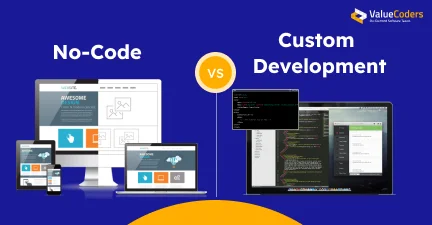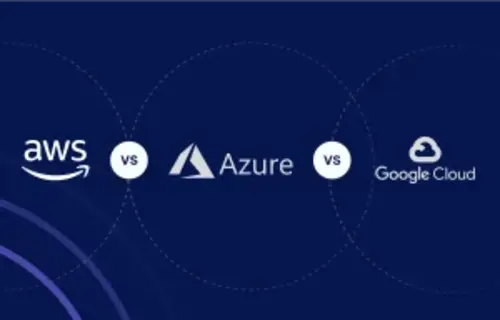Cloud Computing is a burgeoning concept in the modern digital world. Be it a normal user or a techy; everybody is now aware of this concept. And like others, you are also familiar with the benefits of Cloud Computing.
Right?
As per the figures from Kommando Tech 95% of companies are now using some popular cloud service. You must have wondered how the latest Cloud Computing trends have enabled businesses to reach their goals significantly.
How has it been digitally transforming how people interact and operate in an environment?
An innovative platform in the field of storage and hosting, cloud services have dramatically reduced the cost of owning tools while enabling scalability for your business.
Moreover, there are emerging cloud computing trends and technologies that companies will be leveraging to innovate and grow. This blog will discuss cloud computing future trends and the innovations transforming the business landscape this decade.
What Is Cloud Computing
Simply put, cloud computing is all about on-demand computing services over the internet. Here users can rent everything, including Software, applications, servers, data, and more, from the cloud service provider, on a pay-for-use basis. Flexibility, increased efficiency, lower operating costs, innovation, and scalability are key benefits of using cloud computing for your business.
Google Photos is a popular example of a cloud-based tool that lets you store photos and videos taken on your phone. It’s a powerful media backup that helps free up space on your mobile device.
The public cloud services market in 2022 was forecasted to surpass around $364 billion. As per Gartner, the orldwide end-user spending on public cloud services is forecast to grow 20.7% to total $591.8 billion in 2023.
Now you’ve got some idea of cloud computing. Want to know the best AWS Cloud Service providers?
Though there are numerous cloud service providers out there, but Amazon Web Services (AWS), Microsoft Azure, and Google Cloud are on top.
Why Is Cloud Computing Important For Your Enterprise?
Gartner predicts that global spending on public cloud products is increasing at an annual rate of 20.4% and is likely to reach $600 billion in 2023. Gartner expects end-user spending on Infrastructure as a Service (IaaS) to grow 30.6% annually.
The outlook for Desktop as a Service (DaaS) is predicted to grow at 26.6%, and the Platform as a Service (PaaS) to grow 26.1%. This suggests that a strong increase in hybrid work is causing organizations to invest about $2.6 billion per annum in cloud migration efforts.
Why is cloud computing important for your business? Why are more and more companies choosing cloud computing? These are important questions for modern enterprises, startups, and professionals.
Convenience and cost-effectiveness are the key reasons companies adopt cloud computing. It has many useful functions applicable to any organization to increase its capacity.
Further, it allows multiple users to work and share data simultaneously.
Cloud computing also enables quick data analysis owing to its powerful processing capabilities. With all such aspects, the demand for new cloud-based solutions is increasing daily.
Also read: AWS Vs Azure Vs Google Cloud: Which Platform Is Best?
Latest Cloud Computing Technology Trends
Some latest technology in cloud computing has profited the business too much extent. Moreover, technology has made tremendous advancements with emerging innovations such as Artificial Intelligence, the Internet of Things (IoT), Blockchain, Edge Computing, and Virtual Reality & Augmented Reality.
Let’s take a close look at these breakthrough technologies that work well in Cloud Computing, unlocking new features and increasing capabilities for businesses:
Cloud Security
Cybersecurity Ventures expects global cybercrime costs to grow by 15 percent per year over the next five years, reaching $10.5 trillion USD annually by 2025, up from $3 trillion USD in 2015.
In 2022, when Statista surveyed about cloud technologies, technical executives, managers, and practitioners worldwide reported that security was the primary difficulty they faced in using these technologies.
85% of respondents felt that security was significant. Common reported difficulties include cloud spending management, inadequate governance, and insufficient resources/experience.
Spreading workloads across various providers creates an extra challenge when faced with managing risk at heart because no single provider has all your information on its system, which poses another problem: who will monitor what if something goes wrong?
The solution lies not just in better cybersecurity practices but also in ensuring a reliable service from vendor A before asking them about B’s capabilities or choosing differently next time around – whatever comes first.
A growing response to these concerns has been the acquisition of cloud security access brokers (CASBs). CASB’s are software that operates between your organization and platforms for securely accessing data, using measures like centralizing governance with an ironclad grip on all aspects of protection.
According to a post by Cision, the global size of the Cloud Access Security Brokers (CASB) market in 2019 was USD 8941.1 million and is predicted to reach USD 36910 Million by the end of 2026, with a CAGR of 22.2 % in 2021-26
AWS cloud has been appreciated for its security provisions. You can connect with an AWS cloud consulting company with the required expertise if you want to leverage its potential for your enterprise.
Also Read: Cloud Computing in Manufacturing: Solutions to Stay on Top
Hybrid Cloud
With a multi-cloud approach, businesses can take advantage of the differing allowances in both public and private clouds. Hybrid strategies are focused on using both types of infrastructure for targeted benefits that align with its users’ needs – increased scalability while still maintaining higher cost efficiency than if they were solely relying on just one type.
A well-designed hybrid system gives businesses more flexibility when scaling up or down depending upon what’s needed; it also has features like faster reaction speeds thanks to being able to draw power from both sources simultaneously without sacrificing security concerns about where data resides (private vs. public).
According to Statista, In 2021, the global hybrid cloud market was valued at 85 billion U.S. dollars and is expected to reach 262 billion U.S. dollars in 2027. Over this period, the Asia Pacific region is expected to grow at the highest rate. Some key players in this market are Cisco, HPE, AWS, and IBM.
Cloud Automation
Many enterprises are turning to automation as a means of simplifying the management of their public, private and hybrid cloud environments. Cloud agnostic tools like Terraform allow organizations easy access to develop identical infrastructure securely across platforms.
This is an amazing feature when you need multiple clouds seamlessly synced together with no manual intervention or coding knowledge required for your company’s IT team members!
In a world with so many clouds, businesses must be able to compare performance and make more informed decisions. Dashboards can do this by providing analytics that gives organizations an idea of how their various services are performing in real time;
But they also need access data from all over your company’s infrastructure, including onsite servers and cloud solutions like AWS Fargate instances or Microsoft Azure public/private Clouds.
In today’s post- multi-cloud era where companies not only rely heavily upon technology, such dashboards’ key metrics will become even more important. This cloud computing solution is a great solution that yields great results.
Data Fabric
The cloud has the potential to change how we think about data storage in a world where security, optimization, and interpretative services require interoperability with different locations type or sources for information-in other words, “a string that connects separated pieces”.
It becomes easier than ever to store your largest assets offsite in an easily accessible format from anywhere at any time without fear they’ll be compromised by hackers downtown who might want access to only one aspect (or even just part)of what you’re working on now think.
By 2022, 90 percent of organizations will use information as a critical organizational asset. To gain access and security to data across cloud providers, an organization needs centralized frameworks like data fabrics which employ APIs for seamless cross-cloud collaboration on consolidated insights into operations.
This reduces vendor lock-in by providing unified service options from one provider; allowing enterprises can leverage them all within their infrastructure rather than duplicating efforts elsewhere, such as with less advanced cloud solutions that may not meet current business demands or offer sufficient features compared with those offered today – also known as “vendor Sovleware.”
Artificial Intelligence (AI)
Artificial intelligence has seen massive growth in the past few years, and combination with other modern technologies, such as Cloud, it gives countless opportunities to industries.
Businesses demand AI solutions, including deep learning and machine learning from cloud companies. Here cloud-based AI plays a major role, enabling enterprises to innovate, scale, and grow.
It empowers companies to extend their capabilities cost-effectively. Excellent computing and storage features make cloud-based AI an ideal solution for any kind of business.
DevOps
DevOps and Cloud together offer leading solutions. The terrifying majority of cloud development employs DevOps to offer impactful services. The advantages of using DevOps with Cloud are speedily increasing, that’s why developers prefer to use both together.
Cloud computing provides DevOps automation with a standard and centralized platform for testing, deployment, and production.
Internet of Things (IoT)
Most IoT devices are already utilizing the cloud to connect these systems and generate useful data on the habits and patterns of users. You might know this; each major cloud platform offers an IoT solution, which is why multiple companies have ameliorated their existing IoT-enabled apps.
IoT technology generates humongous amounts of data that need to be stored in cloud storage or cloud-based applications.
Edge Computing
Edge computing greatly supports IoT applications by providing increased processing power and fast response. It has an excellent ability to process and store data while reducing latency.
Edge computing is critical because it generates new and improved ways for the enterprise. It maximizes operational efficiency, enhances performance and safety, automates all core business processes, etc.
As a result, edge computing helps create business-like applications for companies. By integrating edge computing with cloud computing, businesses can unlock new possibilities in this modern digital world.
Blockchain
Blockchain technology has benefited various sectors, including banking & finance, logistics, healthcare, and more. It can be effectively applied to any industry involving the tracking of digitally-recordable transactions. Improved transparency, traceability, and security are the core factors that make this technology crucial for businesses.
Today, major cloud service providers are making it easy for enterprises to adopt blockchain technology, which is a perfect fit for cloud solutions. With the cloud, all sorts of organizations can leverage the benefit of blockchain, such as large-scale data analysis, and data security.
Virtual Reality (VR) and Augmented Reality (AR)
When it comes to improved customer experience, applications of Virtual Reality (VR) and Augmented Reality can be effectively applied. But it requires appropriate computing resources, such as the Cloud, which has the capability to deal with AR/VR applications.
Cloud tools make it easy for developers to create, test, and deploy these applications. Using the Cloud in combination with AR/VR, companies can offer impressive experiences to their customers, along with meeting the core business purposes.
Microservices
Microservices are software architecture, collections of various independent services. Each service has a definite business focus and interacts with the other language-agnostic etiquette, such as REST.
The microservice architecture allows the speedy, frequent, and guaranteed delivery of large, complex applications. When microservices are combined with Cloud computing, it offers amazing functionalities and enhances app performance.
Containers
Containers are a sort of operating system (OS) virtualization. A single container might be utilized to run small microservice or larger applications.
Containers hold various elements such as files, libraries, and environment variables required to drive desired Software.
As per Statist ,50 percent of organizations worldwide have already adopted Kubernetes. It was initially developed by Google to group containers into logical units for easy management, so it’s not surprising that the open-source platform has become a standard for container management and orchestration.
Serverless
Serverless computing is a cloud computing performance model in which the cloud provider handles the server and dynamically controls the allocation of machine resources.
It offers lots of benefits, that’s why nowadays enterprises prefer to use it. It can alter the way you do work in your business and empower it to be brisker and faster.
Omni-Cloud
Omni-cloud computing makes the application more robust and portable. It also offers top-notch connectivity; this allows multiple platforms to streamline their data.
Quantum Computing
Quantum computing focuses on building computer technology based on the origins of quantum theory. This describes the behavior of energy and material on the atomic and subatomic levels. Classical computers that we employ today can only encode information in bits.
Kubernetes
Kubernetes is an open-source container orchestration system for automating computer application deployment, scaling, and management. It was designed by Google and is now managed by the Cloud Native Computing Foundation.
Also Read: AWS vs Azure vs Google Cloud: Which Platform Is Best?
Which Famous Applications Are Deploying The Latest Cloud Computing Technology?
Several applications are there which are using Cloud computing. Seeing the increasing benefits of cloud computing, most companies prefer to use this in web and mobile app development projects. View a few famous applications that employ Cloud Computing.
- Chatbots: Alexa and Google Assistant
- Communications: Skype, WhatsApp
- Business Management: Salesforce, Hubspot
- Social Networking: Facebook, Twitter
- Entertainment: Netflix
Conclusion
With the promising technologies explained above, Cloud Computing has a flourishing present and future in the business landscape. It is one of the best areas where other emerging technologies can be blended to create sustainable business environments.
Today, most companies are adopting a cloud solution as it offers innovative ways to grow and develop in the future. Suitable to companies of all sizes, cloud-based applications will continue to play an important role in technological advancements.
We offer Google App Engine Development services to make app deployment scalable and seamless. Do you need a cloud computing solution for your next project? Or do you want to expand your business capabilities in a cost-effective way? We at Value Coders can help you with this.
Our advanced AWS cloud service efficiently meets your comprehensive business requirements. We have a strong team of cloud professionals who provide you with scalable, flexible, and reliable cloud-based applications in a time-bound manner.
With impressive AWS and Azure cloud services, we deliver an end-to-end solution for your unique application needs.








